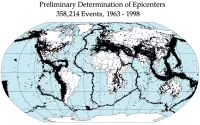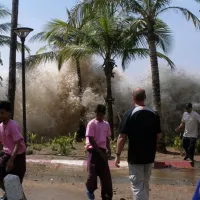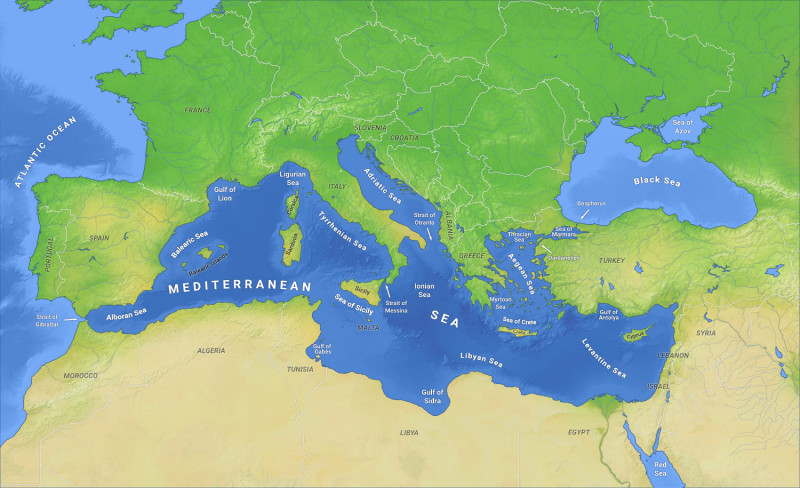The Mediterranean Sea is a sea nearly enclosed by land, connected to the Atlantic Ocean via the Strait of Gibraltar. It's bordered by West Asia (Levant, Anatolia), Southern Europe, and North Africa. Covering approximately 2,500,000 km2, it represents a small fraction of the global ocean surface. Its connection to the Atlantic is a narrow 14 km strait between Europe (Iberian Peninsula) and Africa (Morocco).
1908: Messina and Reggio Calabria destroyed by tsunami
In 1908, a disastrous tsunami destroyed the cities of Messina and Reggio Calabria.
1970: Sediment cores drilled
In 1970, sediment cores were drilled, leading to theories about the Mediterranean's past. These theories suggested that about 6 million years ago, the Mediterranean was around 3,000 metres (10,000 ft) below the current sea level and included arid deserts blanketed with evaporite salts.
1975: Further sediment core drilling
In 1975, further sediment cores were drilled, supporting theories that about 6 million years ago, the Mediterranean was significantly lower and contained arid deserts with evaporite salts.
1999: Greenpeace report reveals bluefin tuna decline
In 1999, Greenpeace published a report revealing that the amount of bluefin tuna in the Mediterranean had decreased by over 80% in the previous 20 years, warning of potential stock collapse without immediate action.
1999: Earthquake diplomacy between Greece and Turkey
In 1999, the Greek–Turkish earthquake diplomacy led to improved relations between traditional rivals in the region after earthquakes in İzmit and Athens.
2003: Tsunami off the Algerian margin
In 2003, a large tsunami occurred off the Algerian margin.
2003: WWF raises concerns about drift net fishing
In 2003, the World Wildlife Fund (WWF) raised concerns about widespread drift net fishing in the Alboran Sea, endangering populations of dolphins, turtles, and other marine animals like the spiny squat lobster.
2013: Operation Mare Nostrum authorized
Following the 2013 Lampedusa migrant shipwreck, the Italian government authorized "Operation Mare Nostrum," a military and humanitarian mission aimed at rescuing migrants and arresting immigrant traffickers.
2013: Mediterranean Sea as a "cemetery"
In 2013, the Maltese president described the Mediterranean Sea as a "cemetery" due to the high number of migrant deaths from capsized boats.
2014: Europe's migration policy turns the Mediterranean into a graveyard
In 2014, European Parliament president Martin Schulz stated that Europe's migration policy "turned the Mediterranean into a graveyard" due to the number of drowned refugees, a direct result of the policies.
2015: Marine heatwaves cause sealife die-offs
A study showed that climate change-related exceptional marine heatwaves in the Mediterranean Sea during 2015 resulted in widespread mass sealife die-offs.
2015: Over one million migrants cross the Mediterranean Sea
In 2015, more than one million migrants crossed the Mediterranean Sea into Europe.
2019: Marine heatwaves cause sealife die-offs
A study showed that climate change-related exceptional marine heatwaves in the Mediterranean Sea during 2019 resulted in widespread mass sealife die-offs in five consecutive years.
Mentioned in this timeline
Africa is the second-largest and second-most populous continent comprising of...

An earthquake is the shaking of the Earth's surface caused...
Sicily the largest and most populous Mediterranean island is an...
France officially the French Republic is a country primarily in...
Turkey officially the Republic of T rkiye is a transcontinental...

A tsunami is a series of powerful waves caused by...
Trending

Eric Swalwell is an American lawyer and Democratic politician currently serving as the U S Representative for California's th congressional...

6 months ago Charissa Thompson Gets Taylor Swift's Pop-Tarts, Approved by Travis Kelce; Dinner Speculation Arises.

23 minutes ago Tsarukyan aims to reenter title contention facing Hooker; tensions rise before UFC fight.
7 days ago Troy University Softball Announces New Signing Class for 2026-2027 Season
25 days ago AT&T and T-Mobile Engage in a Heated Dispute Over Network Claims

6 months ago Rebecca Ferguson's Mission Impossible Exit: Cruise's Missed Opportunity and Dead Reckoning Fate
Popular

XXXTentacion born Jahseh Dwayne Ricardo Onfroy was a controversial yet...

William Franklin Graham III commonly known as Franklin Graham is...

Cristiano Ronaldo often nicknamed CR is a Portuguese professional footballer...

Candace Owens is an American conservative political commentator and author...

Michelle Obama is an American attorney author and former First...

Marjorie Taylor Greene known as MTG is a far-right American...
